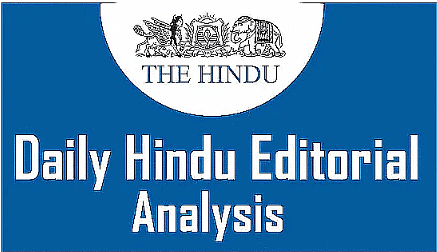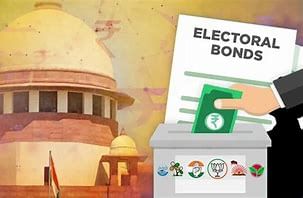The Hindu Editorial Analysis- 11th March 2024 | Current Affairs & Hindu Analysis: Daily, Weekly & Monthly - UPSC PDF Download

Electoral bonds, the State Bank and the Art of Evasion
Why is it in the News?
Recent Supreme Court Decision: On February 15, 2024, the Supreme Court of India invalidated the Electoral Bond Scheme operated by the State Bank of India, citing its unconstitutionality.
- Significance of the Decision: The cancellation has far-reaching implications for political parties and the general public, particularly in enhancing electoral transparency.
State Bank of India's Response to Supreme Court's Electoral Bond Scheme Judgment
- Following a recent Supreme Court judgment regarding the Electoral Bond Scheme, the State Bank of India (SBI) has been mandated to provide details to the court by March 6, 2024. These details include the purchase dates and denominations of electoral bonds, as well as information on the Indian political parties acquiring the bonds. This directive aims to enhance transparency in India's political funding landscape.
- In its communication with the Supreme Court, SBI has requested an extension until the end of June 2024 to furnish the data. This timeline extension goes beyond the expected date of the 2024 general elections to the Lok Sabha in India.
- SBI has acknowledged challenges in acquiring electoral bonds and plans to publish the data on its official website within the next three months to meet the court's requirements.
- Furthermore, the bank has committed to implementing measures to streamline the process of reporting details about Indian political parties purchasing electoral bonds.
In summary, State Bank of India is responding to the Supreme Court's directives on the Electoral Bond Scheme by ensuring transparency in political party funding. Despite facing obstacles, SBI aims to release the necessary data within the stipulated timeframe and improve the overall process for reporting such transactions.

Data Privacy and Processing:
- The Supreme Court of India has instructed the State Bank of India to disclose only information related to the issuance of electoral bonds. This information does not reveal the exact link between the donor and the political parties involved.
Donations through Electoral Bonds in India:
- Recent data on donations via electoral bonds during India's general elections indicates that the Bharatiya Janata Party received 57% of its funding through electoral bonds. In contrast, the Congress party received only about 10% of its funds through this channel.
Supreme Court's View:
- On February 15, 2024, the Supreme Court of India unanimously decided that the Electoral Bond Scheme violated the constitutional rights of Indian citizens. These rights include the freedom of expression and the right to information, as guaranteed by the Indian Constitution under Article 19(1)(A).
Introduction to Electoral Bond Scheme:
The Electoral Bond Scheme in India serves as a method for political parties to receive funding in the form of donations for elections. Recently, a significant verdict was reached by a Five-Judge Constitution bench of the Supreme Court on February 15, 2024, leading to the cancellation of the scheme.
- The Electoral Bond Scheme was initially introduced in the Indian Parliament through the Finance Bill in 2017.
- On September 14, 2017, an NGO known as the 'Association for Democratic Reforms' (ADR) challenged this scheme in the Supreme Court as the primary petitioner.
- Following this, on October 3, 2017, the Supreme Court issued notices to both the Central Government and the Election Commission of India regarding the PIL filed by the aforementioned NGO.
- January 2, 2018, marked the official notification of the Electoral Bond Scheme by the Central Government in India.
- Subsequent amendments were made to the scheme, such as increasing the number of sale days from 70 to 85 in a year, allowing for the scheduling of assembly elections.
- On October 6, 2023, Chief Justice of the Supreme Court of India, D.Y. Chandrachud, referred the petitions against the scheme to a five-judge constitution bench.
- Further proceedings took place, with a five-judge Constitution bench, also led by Chief Justice Chandrachud, initiating the hearing of petitions against the scheme on October 31, 2023.
- On November 2, 2023, the Supreme Court reserved its decision regarding the scheme.
- Ultimately, on February 15, 2024, a historic judgment by a Five-Judge Constitution bench of the Supreme Court declared the Electoral Bond Scheme as unconstitutional.
Overview of the Electoral Bond Scheme
- The Electoral Bond Scheme was introduced in India in 2008 to enable the anonymous contribution of funds to political parties for election-related expenses.
- Initially restricted to India, this scheme was designed with a time-bound purpose, which has since lost relevance in contemporary times.
- A recent ruling by the Supreme Court of India seeks to address the current challenges and implications faced by the stakeholders involved.
- The Electoral Bond Scheme was introduced in the Indian Parliament as part of a Finance Bill in 2017 and put into effect in 2018.
- These bonds function as a channel for both individuals and organizations to contribute funds to registered political parties anonymously, withholding the donors' identities from the public.
- Notably, electoral bonds in India are devoid of interest and can be redeemed by the holder at any time.
Key Aspects of Electoral Bond Scheme:
- The Electoral Bond Scheme's inception and enforcement occurred through a Finance Bill in 2017 and subsequent implementation in 2018.
- Individuals and institutions can utilize electoral bonds to offer financial aid to registered political parties without disclosing the donor details publicly.
- Electoral bonds do not accumulate interest and can be encashed by the bondholder upon request.
Eligibility of Political Parties to Purchase Electoral Bonds in India:
- Only political parties registered in India that have obtained at least 1% of the total votes in the previous general election for the Lok Sabha or Assembly are qualified to buy electoral bonds.
- Electoral bonds are obtainable solely through digital platforms or by cheque within India.
- Redemption of electoral bonds within India is restricted to the designated bank account of the respective political party.
Authorized Issuing Banks for Electoral Bonds in India:
- The State Bank of India is the sole authorized issuing bank for electoral bonds in India.
- Electoral bonds are exclusively issued through designated State Bank of India branches across the country.
Supporting Crony Capitalism:
- The electoral bond scheme in India eliminates previous restrictions on political donations, enabling powerful corporations to fund elections. This opens the door to crony capitalism.
- Crony capitalism refers to a capitalist system where close collaboration between business figures and government officials leads to mutual benefits. This poses a potential threat to India's democratic framework.
Electoral Bond Scheme in India: Urgent Need for Transparency and Reform
- The Supreme Court of India has been urged to prompt the State Bank of India (SBI) to enhance diligence in providing information on the Electoral Bond Scheme before the 2024 Indian elections, specifically the Lok Sabha elections.
- A crucial decision from the Supreme Court underscores the pressing requirement to revamp the existing electoral bond system to facilitate fair and democratic elections in India, emphasizing transparency in the electoral process.
- SBI has a vital role in ensuring transparency and fairness within the electoral bond system, aligning with the Supreme Court's directives to promote integrity and transparency in India's electoral processes.
- Government attention is imperative to guarantee transparency and fairness in India's electoral procedures.
- Enhanced transparency measures are urgently needed within the electoral bond scheme to prevent potential misuse, breaches of donation limits, and illicit financial activities.
- Stringent regulations must be in place for political parties to disclose donations to the Election Commission, empowering the Commission to investigate contributions, including electoral bonds and election expenses.
- Addressing existing inadequacies in electoral bonds is critical to mitigate risks such as misuse, donation limit violations, and the influx of illicit funds in India's electoral processes.
- Timely implementation of the Electoral Bond Scheme through judicial oversight, periodic evaluations, and public engagement is vital to address emerging concerns regarding democracy in India, adapting to evolving political landscapes, and fostering a more inclusive decision-making environment.
- Significant political reforms and effective regulation of political financing are imperative to break the cycle of corruption prevalent in India's democratic and bureaucratic systems, elevating the quality of democratic governance.
- To enhance accountability and transparency in India's governance framework, rectifying loopholes in existing laws related to the Electoral Bond Scheme is of paramount importance.
- Initiating voter awareness campaigns can bring substantial changes to the electoral bond scheme, empowering voters to understand democratic principles and reject candidates engaging in excessive spending or electoral malpractices.
- Educating voters on democratic values and encouraging them to reject candidates resorting to unethical practices can propel Indian democracy towards a brighter future, aligning with its foundational principles.
|
52 videos|5374 docs|1136 tests
|
















